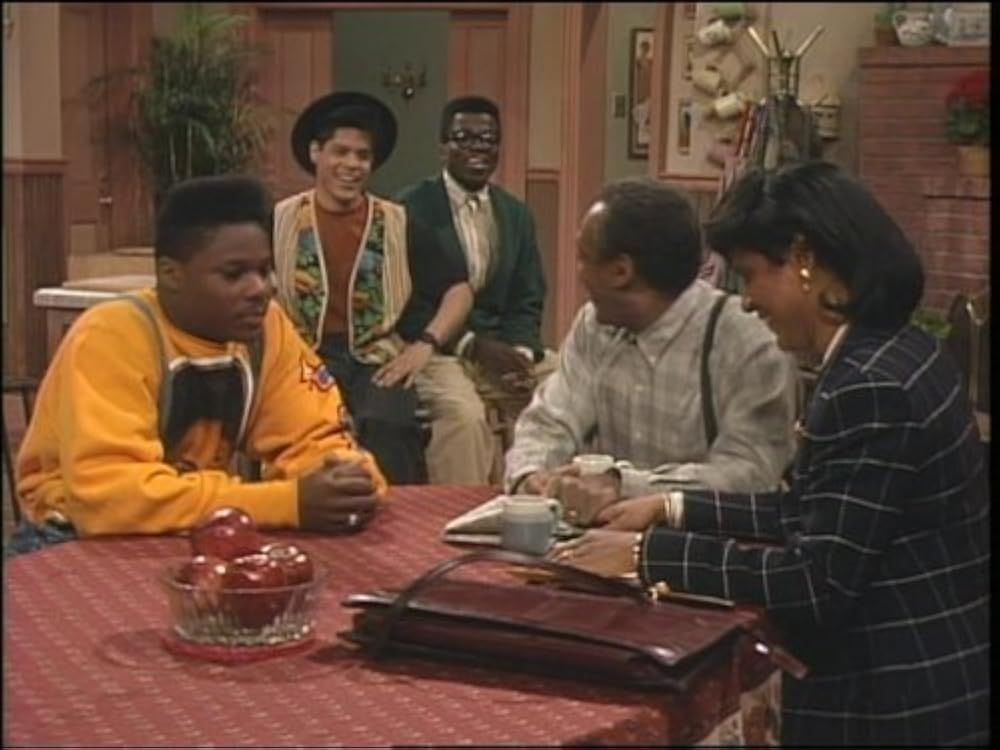
It wasn’t just a sitcom. It was a movement.
For millions of viewers across America and beyond, The Cosby Show was more than just 30 minutes of laughter. It was a weekly masterclass in identity, hope, ambition, and possibility. The Huxtable family didn’t just entertain—they educated, inspired, and laid the foundation for what many still call The Huxtable Blueprint: a model for dreaming bigger, loving deeper, and striving for more.
A Different Kind of Representation
In the 1980s, television had no shortage of families—but none quite like the Huxtables. Cliff, Clair, and their five children redefined the American Dream for a generation that had rarely seen themselves reflected in media with such authenticity and dignity.
They weren’t perfect. That was the beauty of it. Theo had trouble in school. Denise was wild and free-spirited. Vanessa struggled with peer pressure. Rudy was a ball of chaos and cuteness. The show never shied away from real-life struggles—it just showed us that overcoming them with love, humor, and guidance was possible.
For Black viewers, it was a revelation. For others, it was an eye-opener.
“I Can Be That Too”
One of the most powerful impacts of The Cosby Show was its subtle but profound influence on the mindset of young viewers.
You could be a doctor. You could be a lawyer. You could go to college. You could raise a family in a brownstone filled with jazz music, framed degrees, and African artwork. You could succeed and stay rooted in culture, history, and love.
The idea that you belong in these spaces was embedded in every episode.
Many public figures, including former President Barack Obama, have cited the show as influential in shaping their vision of what was possible. When a generation sees success modeled in a relatable, accessible way, it raises the bar for everyone.
Parenting Lessons in Prime Time
If there’s one thing The Cosby Show nailed with absolute brilliance, it’s the parenting.
Cliff and Clair were the gold standard. They weren’t authoritarian, but they weren’t pushovers either. They balanced discipline with humor, sarcasm with sincerity, and always found a way to teach without preaching.
They gave their kids room to fail—but not to fall.
From Cliff’s hilarious heart-to-hearts with Theo about finances (“That’s the dumbest thing I’ve ever heard in my life!”) to Clair’s fiery monologues defending her daughters’ right to ambition and independence, the Huxtables parented with love, wisdom, and grace.
In a world where many kids lacked strong role models, Cliff and Clair stepped in and became the TV parents America didn’t know it needed.
Fashion, Culture, and Cool
Let’s talk about aesthetics—because The Cosby Show made being smart and successful cool.
From Denise’s eclectic Bohemian outfits to Clair’s powerful blazers, the show was a fashion moodboard decades before Instagram made that a thing. Even Cliff’s sweaters became iconic, turning knitwear into a cultural statement.
The show wove African-American culture into the very fabric of its scenes: jazz records, dance performances, soul food dinners, historical references. It didn’t lecture the audience about Black culture—it celebrated it, lived it, wore it with pride.
The message was clear: You can honor your heritage and still dominate your future.
HBCU Love: The Show That Boosted College Dreams
One of the most tangible impacts of The Cosby Show was the surge in applications to historically Black colleges and universities (HBCUs). The show made college look exciting, prestigious, and—most importantly—possible.
The spin-off, A Different World, took it further, placing students directly inside the walls of an HBCU and highlighting the challenges and triumphs of Black student life.
This wasn’t accidental. The creators intentionally spotlighted education and Black excellence to inspire. And it worked. College enrollment among African-American youth rose significantly during the show’s heyday—a phenomenon researchers dubbed The Cosby Effect.
Critics and Conversations: It Wasn’t All Praise
Of course, no cultural juggernaut escapes critique.
Some argued that The Cosby Show painted too rosy a picture of Black life in America, sidestepping racism and systemic issues. Others felt it was too focused on the upper-middle-class experience, ignoring the realities many Black families faced.
But fans pushed back. The point of the show was never to ignore struggle—it was to redefine possibility. For decades, the media spotlight had fixated on pain. The Cosby Show offered a counter-narrative: joy, strength, ambition, and pride.
Representation doesn’t have to be singular. It can be multifaceted—and The Cosby Show opened the door for that complexity to take root.
Legacy: The Dream Lives On
Even today, the Huxtables remain a cultural reference point. From memes to musical references, from sitcom tributes to TikTok reenactments—their legacy lives on.
And that’s no accident.
The Huxtables didn’t just shape a generation of dreamers. They dared us to believe in more—for ourselves, our communities, and our futures.
They made us laugh, yes. But they also made us think, made us grow, and maybe most importantly—made us hope.
Because if a quirky dad in a sweater could raise five unique, strong, loving kids in a household full of laughter, wisdom, and rhythm—then maybe, just maybe, the rest of us could do it too.
